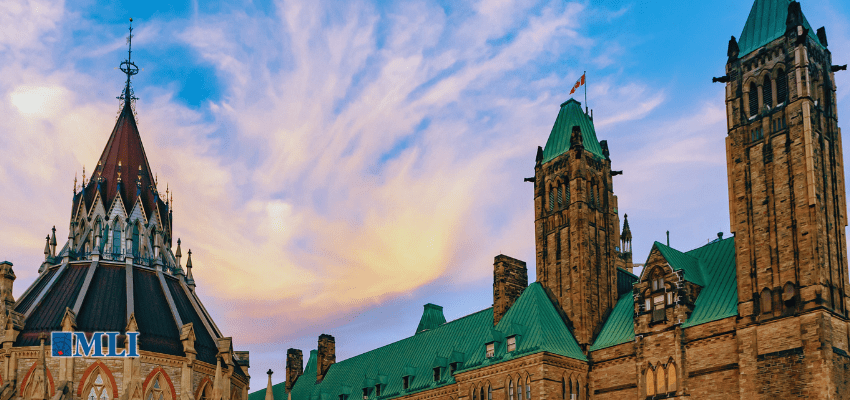This article originally appeared in the Globe and Mail.
By Ryan Manucha, December 11, 2024
Donald Trump’s “America First” bombast and promise of a 25-per-cent tariff on imports threaten to upend Canada’s economic stability. Over the coming weeks, Canada’s first ministers will rapidly assemble a playbook for how to handle the demands of the incoming U.S administration.
Beyond managing Mr. Trump’s immediate wants, our leaders should consider the lessons from 19th century Canadian history, which now, more than ever, instruct us to strengthen our own economic union and dismantle trade barriers in our own backyard. Now that access to the American market is under threat, let’s remember we have a big internal market that we’ve yet to fully tap.
On the eve of Confederation in 1867, Canada’s Fathers of Confederation averaged approximately 50 years old. These men had their economic worlds turned upside down twice during their adulthoods by the whims of foreign governments. In the 1840s, Britain repealed the Corn Laws, ending imperial preferences for Canadian goods. The value of Canadian flour nearly halved and a glut of timber piled up in Quebec ports with nowhere to go. Lord Elgin, the governor-general of Canada at the time, captured the destitute Canadian conditions and national frustrations with Britain in a letter to Earl Grey in Britain, explaining that Canada had been left an economic wreck and that its prosperity had been “robbed” and transplanted to England. The consequences of repeal were so grave they even gave rise to a short-lived movement to join the U.S.
Hardly 20 years later in 1866, Canada suffered a second economic shock at the hands of a different foreign government. The U.S. terminated an 1854 free-trade agreement, once again shaking the economy of pre-Confederation Canada. Twice was enough for Canada’s Victorian-era leaders. Globe founder and then-opposition leader George Brown, in arguing for Confederation, advanced that “one of the best features of this union is, that if in our commercial relations with the United States we are compelled by them to meet fire with fire – it will enable us to stop this improvidence and turn the current of our own trade into our own waters.” Mr. Brown firmly believed that economic union would provide national strength and insulate against the recurring protectionism of foreign powers.
The nation of Canada was forged in part as a response to the harmful trade policy changes of foreign governments. Canada must once again look within for economic resilience and prosperity. Specifically, it must renew focus on obstacles to trade within our own borders.
Economists model that the patchwork nature of Canada’s regulatory landscape imposes the equivalent of a 7-per-cent tariff on goods that cross provincial and territorial boundaries. Another study suggests that the Canadian economy could grow by between 4.4 per cent and 7.9 per cent (between $110-billion and $200-billion a year) if internal trade barriers were fully eliminated by mutual recognition policies – an extremely powerful tool to improve internal trade. Complete unfettered free trade is not the answer, as provincial autonomy must be respected and unique local conditions will forever demand nuanced regulations. But the numbers suggest that there is considerable room to improve.
Gone are the days of tariff officers at intercolonial frontiers. The work ahead is technical and will require extensive collaboration amongst Canadian regulators. But our internal trade community has already proven that they can accomplish great things when first ministers prioritize removing domestic trade barriers.
In 2019, for the first time, Canada’s provincial and territorial governments finally aligned on a single set of construction codes that is progressively going into effect across the country, saving up to $1-billion by 2028. More recently Canada’s governments announced a mutual recognition project to tackle disharmonious trucking regulations, signalling an exciting shift toward the use of mutual recognition agreements. Trade barriers facing Canada’s truck transportation industry add approximately 8.3 per cent to freight rates, and hinder the economy by $1.6-billion a year, making mutual recognition reform efforts exceedingly worthwhile.
The Canadian Free Trade Agreement’s indefatigable Regulatory Reconciliation and Cooperation Table will continue to serve as the agent of change, and the Internal Trade Data Hub released by Statistics Canada earlier this year supports a data-driven approach to trade barrier identification, measurement and resolution. But nothing replaces clear and ambitious direction from the premiers and prime minister.
Given the surge in protectionist thinking globally and from our southern neighbours, now is the ideal moment for Canada’s political leaders to learn from the Fathers of Confederation and revitalize the economic union by working together to mutually recognize and harmonize underpinning regulations.
Ryan Manucha researches interprovincial trade and is a contributor to the Macdonald-Laurier Institute. He is frequently called upon to advise agencies and governments, and his book on the subject won the Donner Prize for best in Canadian public policy.







